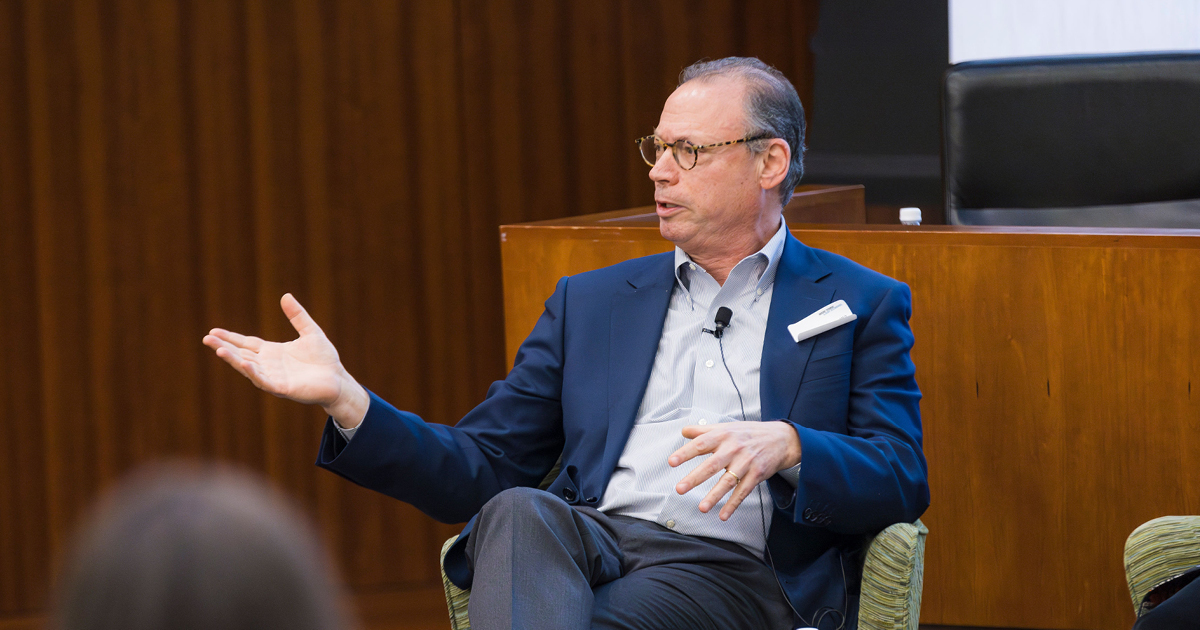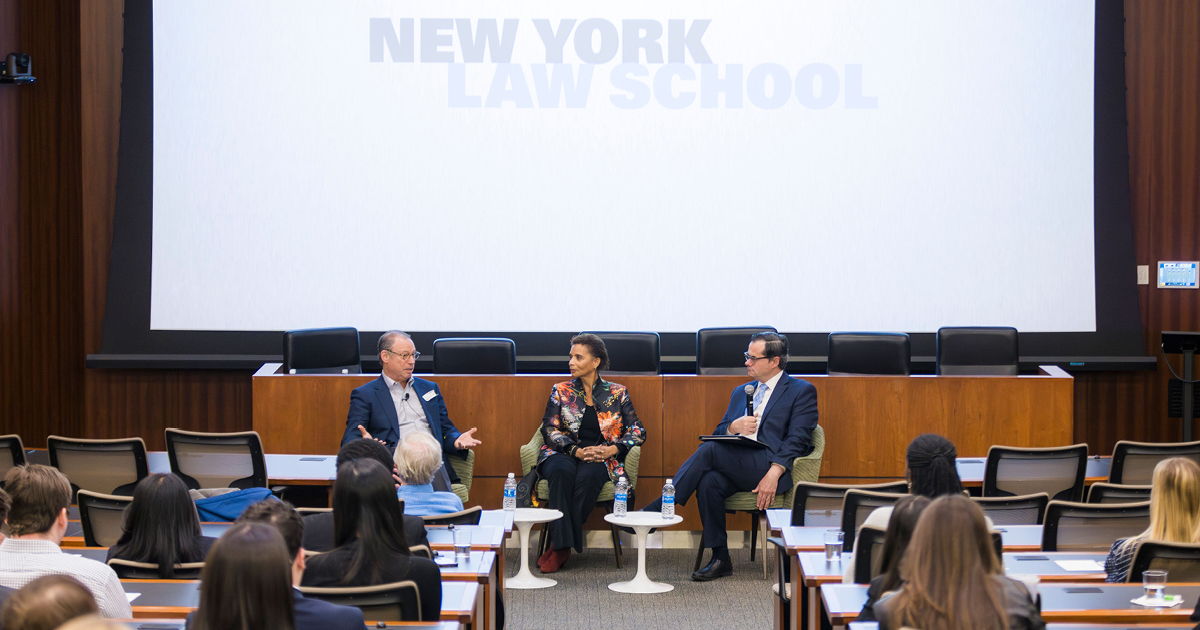Alumni Spotlight:
Andrew C. Kassner ’83
Our Alumni Spotlight Series highlights some of the most exciting, ambitious, and successful members of our alumni community — NYLS graduates who are making real differences in New York City and beyond.
In our first installment of 2024, we caught up with Andrew C. Kassner ’83, whose 40-year career in bankruptcy law and firm management included one of the largest law firm mergers in American history.
“If you asked me to do physics, that would have been a problem.”
Kassner didn’t come from a long line of lawyers — his father was the first lawyer in the family. But his “intelligent, hard-driving” father gave him a look into life as a lawyer, and Kassner had a set of skills and passions that fit right in. He always enjoyed reading and writing and was a strong and skilled communicator. Critical thinking and problem-solving were necessary challenges for his brain, too. They came easily to him, he says. “If you asked me to do physics, that would’ve been a problem,” he says, with a laugh. “My oldest son is a physicist, and I have no idea where he got that from.”
Besides those skills and interests, so much of what drove Kassner — which continues today — is a voracious curiosity. In college, Kassner worked part-time in a storied Philadelphia law firm’s library, which allowed Kassner time to follow his curiosity. “I was supposed to insert update pamphlets into the case books, but often I would sit in the library and just read the cases. I might not have fully understood it then, but I read them anyway. They’d tell you the facts and review the law. They’d tell you the decision.” It was early exposure to the path he would eventually take.
Different campus, same quality instruction.
When Kassner arrived at New York Law School from the University of Pennsylvania in the early 80s, it was a different place than it is today. “It was heavily weighted with night students,” he says, and like today, many students already had first careers before pursuing their law degrees. The School’s footprint was much smaller though, and the neighborhood was different too. Kassner remembers a long-ago shuttered run-down bar around the corner where his friends hosted his surprise bachelor party in 1983.
Kassner remembers the exceptional caliber of the professors and how much students benefited from their instructors' outside-the-classroom practices, like Kassner’s entertainment law professor who represented Blondie, ACDC, and other rock bands in the 1980s. “I had great teachers,” he says. “Many had a lot of real-world practice experience, and they were quality law professors.”
“I learned how to get on my feet. I learned how to be in front of judges. I learned how to be pragmatic.”
Instead of following the traditional path of many of his peers and joining a big law firm, Kassner clerked at a smaller firm where the partners afforded him tremendous responsibility. It was there that he first explored what would become his niche: bankruptcy law, now known as restructuring, which at the time was not the popular field it is today. He was offered an associate job while still working part-time as a student.
Looking back, Kassner sees a critical element of that first job that he carried with him over his career: the necessity of investing in talent development. It’s a massive challenge for law firms today, he says. At big law firms today, associates struggle to get the real hands-on experience that Kassner had at that smaller firm, where his team was just him and a partner. Once he was admitted to the bar, Kassner was handling hearings — usually more than one — in State and Federal District Court almost every day. “I learned how to get on my feet. I learned how to be in front of judges. I learned how to interact with clients and how to be pragmatic,” he says.
Critically, Kassner had mentorship and sponsorship — a too-often overlooked keystone of talent development.
“There’s nothing better than winning when you’re part of a team”
After relocating to Philadelphia, one day, a man named Joe Dworetzky asked Kassner to join him after a lunch at a sushi bar. Dworetzky was a top bankruptcy lawyer in Philadelphia and headed the bankruptcy practice at Drinker Biddle & Reath, one of the old-line top Philadelphia firms. He made Kassner an offer to join the firm and work alongside him. Kassner accepted.
Dworetzky was a “brilliant lawyer, who put incredible effort into his practice and enjoyed the law,” and he offered Kassner critical mentorship — a value Kassner took with him over his career. Today, being called a person’s mentor and sponsor is “the biggest compliment I can get,” he says. Dworetzky and Kassner would talk strategy and the law, and then Dworetzky would send Kassner off to handle the matter. The responsibility and trust gave Kassner exceptional experience and confidence. “He also had my back when things were tough, and sometimes they were.”
“I believe that although today law firms spend massive resources on formal training programs and development, back in my time as an associate the way to become an excellent lawyer was to learn from an excellent lawyer,” he says, and that mentorship still makes the difference today between being a legal technician and being a truly stellar lawyer.
Being part of Dworetzky’s team also brought him satisfaction and fulfillment in his new role. “There are a lot of lawyers out there who practice as silos. They hold all their work close to them; they want to make sure they have the origination credits and are the sole contact with clients,” he says. “And let’s face it. I love winning. Winning is fun. But there’s nothing better than winning when you’re part of a team. When you win as part of a team, it just lifts everyone up.” That applies to the practice of law, but it also applies to management of an organization.
“You have to keep changing to stay the same.”
In 1993, when Kassner was a second-year partner, he was asked to step into a new role: replacing Dworetzky, who left the firm to become Philadelphia’s city solicitor under Mayor Ed Rendell, as the head of the firm’s bankruptcy practice. It was his first experience with firm management, which would become a major part of his career with the passage of time.
As a manager, Kassner realized that one needs to lead by example, develop teams and talent, and focus on collaboration while also delegating responsibility to team members. He also became responsible for a concerted effort of talent acquisition and understanding what potential applicants want in the workplace and their careers. “People want to be at a firm that they feel proud of, where they do really good work, and they feel like they're being valued and part of a team,” he says.
Kassner became active in the firm’s recruitment efforts. He was named the firmwide hiring committee chair, and he introduced major changes to the structure and process of the firm’s hiring system. These changes were necessary for the firm to evolve with changing times to maintain its status of getting excellent talent and being a top tier firm: “You have to keep changing to stay the same,” he says.

Andrew C. Kassner ’83 speaking at the New York Law School Dean’s Leadership Council Retreat.

Left to right: Andrew C. Kassner ’83; Susan Hinkson '98, LL.M. '12; and Dean Anthony W. Crowell
“It’s a talent business.”
By 2005, Kassner had been at the firm for almost 20 years and was on the firm’s board, the firm’s partner compensation committee, and was still the head of his practice group. The firm was in the process of selecting a new leader when Kassner received a call from Alfy Putnam, who proposed they lead the firm together with Putnam as Chair and Kassner as Executive Partner. In that role, Kassner oversaw the firm’s business operations and lead the firm’s strategic planning committee in developing the firm’s updated strategic plan that would take Drinker Biddle from being a regional firm to a national firm.
“My vision was pretty simple. Philadelphia is an amazing city, but law is a talent business. And if you want top investment management lawyers, you need to go to New York, Chicago, and Washington, where many of them are located, in large legal markets. And a national litigation practice requires a real presence in California.” So, the firm put in place a strategic growth plan, and Kassner and his colleagues expanded the firm’s footprint into markets where clients required support and talent was located, doing mergers with other firms and acquiring groups. By 2015, the firm was 550 lawyers strong, with offices in Chicago, Dallas, Los Angeles, New York, Philadelphia, Washington, and elsewhere. And when Putnam’s term was up in 2015, Kassner stepped into the role as Chair.
“Lawyers vote with their feet.”
With the firm now operating as a national firm, Kassner started to consider further growth, and opportunities for a bigger expansion, which ultimately ended up involving one of the industry’s largest law firm mergers. The merger involved two similarly sized venerable AmLaw100 firms, both organized with 13 practice groups, the four biggest of which were the same in both firms. The geographies were compatible too, and with the firms’ combined footprint, they were poised to become a AmLaw50 firm.
Of greater importance, the cultures between the firms were also a fit: Both focused on relationships and collaboration, which was critical. “The business case was compelling, but if people didn't really get along and didn't believe in it, it would be a mess,” he says.
The merger was a “very heavy lift,” he says, and joining two firms with over 500 lawyers apiece into one firm with over 1,200 professionals and 2,500 people across 20 offices and three countries took two full years to hammer out, led by Kassner and Tom Froehle, his Faegre Baker Daniels counterpart, and teams from both firms.
The new firm became Faegre Drinker Biddle & Reath on February 1, 2020, and unbeknownst to them at the time, the leadership had to integrate two large law firms into one during the pandemic. But four years later, “I’m really proud that the merger has been a success,” he says. “Lawyers vote with their feet, and we’re getting access to even better talent, which is what I wanted. The firm is now poised for the next stage of growth.”
“This merger was not the end, it was the beginning.”
“One of the hardest things for a law firm to do is move to the next generation and succession,” Kassner says, and after over 18 years in management, Kassner and Froehle decided that it was time to step back. In April 2023, Kassner took the role of Chair Emeritus and Gina M. Kastel became the firm’s Chair.
“Emeritus means you are available to help when asked,” Kassner says, and he now focuses on the restructuring sector, the relationships he’s spent decades developing, and his particular area of interest: growth. “This merger was not the end, it was the beginning,” he says. He sees a field full of competition — both with Gen Z’s different needs and expectations, the changing landscape of the American workforce, and the evolving needs of clients. Now, firms are tasked with answering the same questions in a different world: How are you going to acquire and develop talent? How are you going to make partners feel attached? “One of my biggest sayings is I don't just want to be a hotel for lawyers. I want to be in a partnership. It’s about the people in every way.”
